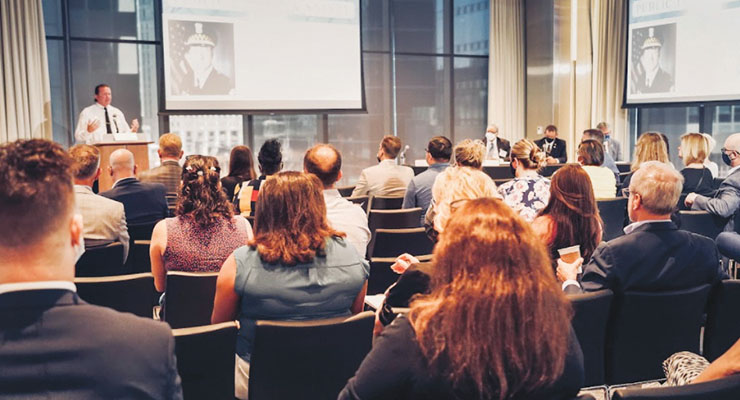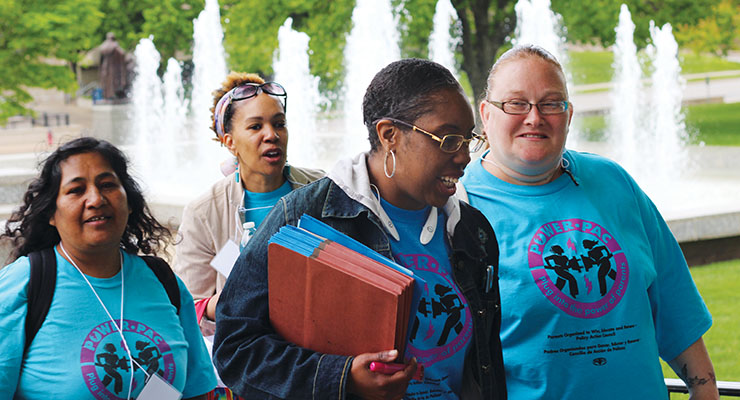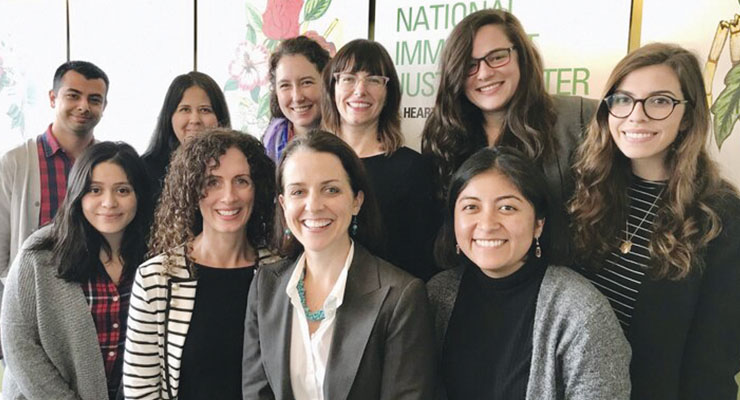By Monica M. Walk
Three local organizations are working on new initiatives to improve life in this community and throughout Chicago.
Chicago Returns
Chicago business owners navigating employees’ return from coronavirus (COVID-19) work-at-home strategaies to in-office work can tap the Chicago Returns website (https://chicagoreturns.com/) for tips.
More than a dozen downtown employers and building operators collaborated on the site, believing in-person connection fuels both immediate and long-term creative business success and that downtown Chicago workers serve as a key driver in the city’s economy.
“Chicago Returns is a group of business leaders focused on conducting outreach efforts to support a return to Chicago where employees, residents, and tourists return to Chicago’s downtown, support local businesses, and jump-start and grow the economy,” said member Amy Masters, director of marketing and communications for BOMA/Chicago, a trade association representing the interests of the Chicago office building industry since 1902.

“Before the pandemic, we had over 600,000 office workers coming downtown who were supporting local restaurants, retail stores, and cultural institutions. While it is imperative to revitalize our central business district as a key economic engine for our city, we also want to see employers and employees return downtown so our local businesses in neighborhoods including the Loop and South Loop can once again thrive,” Masters said.
Website resources include a “Back to Office Toolkit,” public transit information, news, downtown discounts, and a list of companies that have announced their return to offices.
Chicago Returns partners are focusing on how best to support business leaders navigating the Delta variant and providing meaningful events and resources that support the continued safe return to offices. Masters noted many buildings have upgraded ventilation and filters and added touchless technology in shared spaces.
“Our office buildings are ready,” Masters said. “We’ve implemented safety protocols and are ready to welcome employers and employees. There is parking, and public transit has so many safety protocols in place. We take COVID seriously, but there is a way to return safely.”
Prior to the Delta setback, Chicago Returns hosted events with business leaders, industry experts, and civic leaders on building and transit safety protocols, public safety, and return to office plans as well as collaboration with the City of Chicago to promote downtown revitalization and neighborhood activity. It will post future activities on the website.
To learn more, go to www.chicagoreturns.com and scroll down to subscribe to information updates. The group also shares information on LinkedIn at https://www.linkedin.com/company/72112606/admin/.
Community Organizing and Family Issues
Community Organizing and Family Issues (COFI) training participants learn leadership skills to improve their own lives and become leaders who help better schools, neighborhoods, and policies affecting their families and communities. The organization focuses on parents to strengthen low-income working families’ power and voice at all levels of civic life, from local institutions and communities to local, state, and federal policy arenas.
“We are working with, primarily, Black and Brown mothers and grandmothers from challenged communities to bring their voices and experiences to the tables where decisions are being made about their lives,” said Tracy Occomy Crowder, COFI deputy director of organizing and policy. “We are a statewide organization with a long history of organizing parents.”
From roots that include working with former president and then-community organizer Barack Obama, COFI has grown to train and organize 5,000 parents across Chicago and into partnerships across the state.

“We believe in the power of parents,” Occomy Crowder said. “We were created 25 years ago to figure out a way to meet parents where they are so they can make decisions in systems that impact their families. We believe parents are experts in their families’ lives and should play a pivotal role in shaping policy that affects them.
“We looked at different ways to do community organizing, particularly relational ways and less confrontational,” she said, noting COFI focuses on “how to incorporate women and family issues—ways to do organizational and leadership development that takes women’s views into account.”
COFI staff developed a multi-phase training program that begins with the individual and moves to family, community, and then policy and systems.
“We start local and personal, with training to expose and own innate leadership, then create space to form relationships,” Occomy Crowder said. Participants set and achieve personal goals, then team goals, then community goals and systemic change. “The model starts within, not with the issue. It’s the growth and development of the personal to the system. It can take time to get there.”
COFI staff observed similar issues among parents across the city and brought the adults together into four ongoing campaigns that address justice in elementary schools to combat the school-to-prison pipeline; food and recess concerns in schools; increased access to early childhood learning programs; and stepping out of poverty by learning about debt, fines, and fees.
Occomy Crowder cites real change resulting from these campaigns.
“We have returned recess to elementary schools,” she said. “We have worked to change schools from ‘zero tolerance’ to restorative justice, made changes to the code of conduct so children in K through third grade can’t be suspended.
“We have worked with the district to implement more social-emotional support,” she added. “As part of a care team, we worked with CPS [Chicago Public Schools] last year; in high schools with resource officers, we had conversations with schools about what they need. And now they can let go of an officer and get other support. It’s holistic safety, not just physical.”
Occomy Crowder reports the citywide process reduced the number of in-school officers and brought a corresponding budget decrease, with a portion of the trimmed officer funding redirected to schools for increased counseling, parent engagement, and youth programming.
COFI’s newest campaign focuses on maternal mental health, particularly for mothers on the West Side. The Bridges partnership with Rush University Medical Center helps pregnant mothers and mothers with newborns and includes parent-to-parent support. “Mental health, and support in general, is a key to thriving,” Occomy Crowder said.
Parents leading these changes are featured in their own words on the COFI website: https://cofionline.org/COFI/parent-campaigns/meet-the-parents/
Schools and organizations looking to build parent teams or increase engagement often contact COFI, which has a “share the learning” philosophy. It launched a Center for Action and Learning during its 25th anniversary, offering workshops across the country to teach organizations how to engage parents as a source of real power. (https://cofionline.org/COFI/learn-how/training-consultation/)

Virtual training options continue as COVID-19 concerns continue. Parent teams also go into schools to tell about the training or talk one on one to parents at school pick-up and drop-off locations.
“We do parent leadership,” Occomy Crowder said. “We believe it takes time to get in touch and to build. Ultimately their leadership can make a difference at any number of tables. They are the experts in their lives, and that expertise can go a long way.”
For more information, visit https://cofionline.org/COFI/. COFI’s main office and mailing address is 2245 S. Michigan Ave., Suite 200, Chicago, IL 60616.
National Immigrant Justice Center
The National Immigrant Justice Center provides free and low-cost legal services and advocacy for immigrants. Chicago’s NIJC offices are among several locations around the country founded by The Heartland Alliance more than 30 years ago with a mission to provide comprehensive legal services to low-income immigrants, refugees, and asylum seekers.
“We are available to help people in the community,” said Kate Ramos, supervising attorney with NIJC’s Immigrant Legal Defense Project and City Legal Protection Fund. “In Chicago, we have a fund from the City, so there is no fee for consultation and service if people qualify; we waive the fees or can find other grants and funding sources. If there is a charge, it is very nominal.”
Ramos said the organization’s broad services mean it can help with everything except student employment and tourist visas. It assists with general immigration, unaccompanied children, victims of violent crime, removal proceedings for those facing deportation whether detained or not, and asylum for a range of issues that may include human trafficking and the additional challenges facing LGBTQ+ immigrants.
“Over the last four years, immigration has been hard—it’s always hard—and access to an attorney makes a huge impact in chances for success,” Ramos said. “Some take advantage of immigrants; we want to make sure people know we are reliable resources. If people don’t have status, we encourage them to get an occasional attorney appointment to see if they are eligible for anything—relief, a Green Card—as circumstances change.”
NIJC works with Centro de Trabajadores Unidos, Centro Romero, Enlace Chicago, Erie Neighborhood House, HANA Center, Indo-American Center, Northwest Side Housing Center, Southwest Organizing Project, the Resurrection Project, and United African Organization to publicize its services. These groups often host NIJC educational presentations, although COVID-19 has made it hard to hold gatherings the past year.
“We get into the community to meet” people, Ramos said. “In church basements, school playgrounds—wherever people want to meet.”
The organization provides trainings virtually at this time, via links from its website, on topics such as “Know Your Rights,” basic relief eligibility, and Deferred Action for Childhood Arrivals (DACA).
“I’m really proud of what we have achieved at the Legal Protection Fund,” Ramos said of the NIJC fund created after the 2016 election. The City of Chicago Legal Protection Fund from the Mayor’s Office and the State of Illinois Access to Justice Program provide funding. NIJC also does its own fundraising and receives donations from smaller fund donors.
“We have worked with someone in every ward in Chicago; 131 different countries are represented,” Ramos said. “That’s how diverse Chicago is—the full spectrum of the beauty of Chicago.
“At the end of the day, we have such diverse communities in Chicago and we want to make sure people feel safe and welcome in their home and community,” Ramos added, noting fear during the last few years has increased requests for NIJC appointments. “Anything we can do to help people feel safer, I’m proud to be part of.”
Schedule intake interviews and legal advice appointments by calling (312) 660-1370. Visit https://immigrantjustice.org/ for more information about NIJC. One of its offices is at224 S. Michigan Ave., Suite 600.
